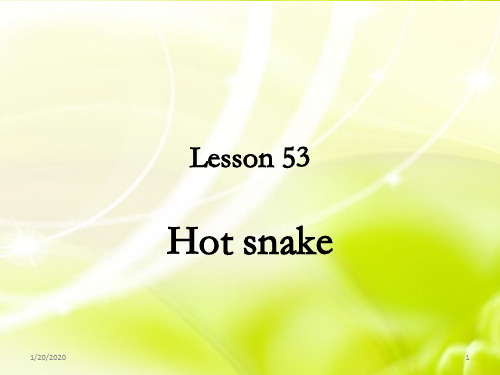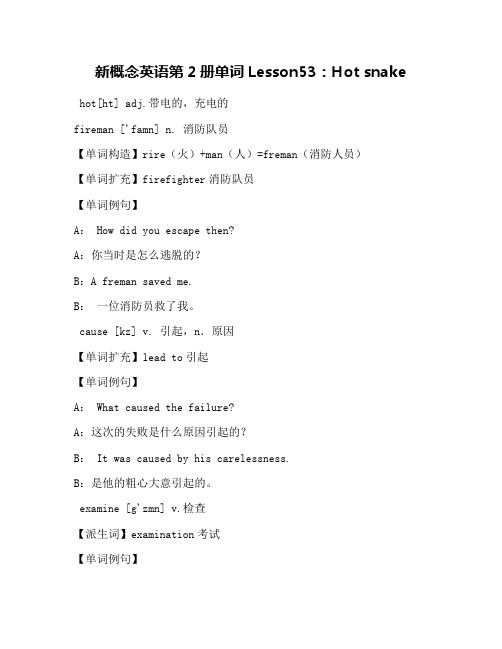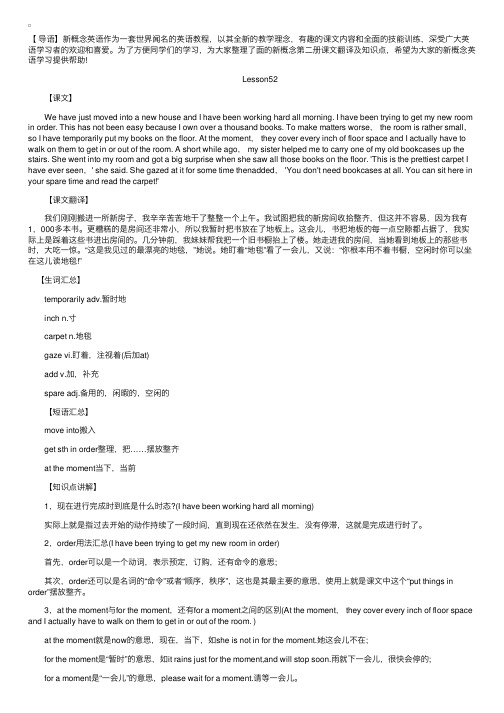最新新概念英语第二册笔记-第53课
- 格式:doc
- 大小:120.50 KB
- 文档页数:11


新概念英语第二册第53课-1课文解析1.At last firemen have put out a big forest fire inCalifornia.消防队员们终于扑灭了加利福尼亚的一场森林大火。
(1)at last(终于,到底)表示经过一番努力之后。
(2)put out能够表示“扑灭”、“熄灭”、“关掉”等含义:Please put the light/ fire out.请把灯关掉/把火灭掉。
(3)forest虽然是名词,但在句中起形容词的作用,修饰fire。
2.…they have been trying to find out how the firebegan.……他们一直试图找出起火的原因。
(1)短语动词find out表示经过研究、努力等“发现”、“找出”、“查出”:I'll try and find out the name of the person who savedmy life yesterday.我将设法查出昨天救我命的那个人的姓名。
(2)how the fire began是 find out的宾语,它是一个由疑问词how 引导的名词从句。
3.They were also quite sure that a cigarette end did notstart thefire.他们还十分肯定火灾也不是由烟头引起的。
(1)start作及物动词时能够表示“使……发生”、“引起”。
(2)be sure后面跟的是名词从句。
that引导的这个名词从句也能够写成that the fire was not started by a cigarette end。
但这里强调的是引起火灾的原因(不是碎玻璃或烟头),所以用烟头作主语。
4.…a fireman accidentally discovered the cause.……一个消防队员偶然发现了起火的原因。
discover本身含有偶然发现(某个已经存有的东西)的含义:l don't know who discovered America.我不知道谁发现美洲的。


新概念英语第2册单词Lesson53:Hot snake hot[ht] adj.带电的,充电的fireman ['famn] n. 消防队员【单词构造】rire(火)+man(人)=freman(消防人员)【单词扩充】firefighter消防队员【单词例句】A: How did you escape then?A:你当时是怎么逃脱的?B:A freman saved me.B:一位消防员救了我。
cause [kz] v. 引起,n.原因【单词扩充】lead to引起【单词例句】A: What caused the failure?A:这次的失败是什么原因引起的?B: It was caused by his carelessness.B:是他的粗心大意引起的。
examine [g'zmn] v.检查【派生词】examination考试【单词例句】A:I have finished my homework.A:我的家庭作业做完了。
B: You'd better examine It.B:你再检查一遍。
accidentally[ks'dentl] adv.意外地,偶然地【单词例句】A: She discovered the secret accidentally.A:她意外地发现了这个秘密。
B: Did she tell it to anyone else?B:她有没有将这个秘密告诉其他人?remains [r'menz] n. 尸体,残骸wire [wa] n.电线volt [vlt] n.伏特(电压单位)【单词例句】A: This is the socket for the electric shaver. It is 220 volts.A:这是电剃须刀的插座,是220伏的。
B: Good.I can use it directly.B:太好了,我能够直接用了。

【导语】新概念英语作为⼀套世界闻名的英语教程,以其全新的教学理念,有趣的课⽂内容和全⾯的技能训练,深受⼴⼤英语学习者的欢迎和喜爱。
为了⽅便同学们的学习,为⼤家整理了⾯的新概念第⼆册课⽂翻译及知识点,希望为⼤家的新概念英语学习提供帮助!Lesson52 【课⽂】 We have just moved into a new house and I have been working hard all morning. I have been trying to get my new room in order. This has not been easy because I own over a thousand books. To make matters worse, the room is rather small,so I have temporarily put my books on the floor. At the moment, they cover every inch of floor space and I actually have to walk on them to get in or out of the room. A short while ago, my sister helped me to carry one of my old bookcases up the stairs. She went into my room and got a big surprise when she saw all those books on the floor. 'This is the prettiest carpet I have ever seen,' she said. She gazed at it for some time thenadded, 'You don't need bookcases at all. You can sit here in your spare time and read the carpet!' 【课⽂翻译】 我们刚刚搬进⼀所新房⼦,我⾟⾟苦苦地⼲了整整⼀个上午。

新概念英语第二册课后题答案详解Lesson531. c根据课文第二行… they have been trying to find out how the fire began 能够判断出只有c. wanted to find out what had caused the fire 最能说明消防队员仔细查看地面的原因,其他3个选择都不够全面。
2. d根据课文第10-12行A bird had snatched up the snake from the ground and then dropped it on to the wires… When it Idid so, it sent sparks down to the ground and these immediately started a fire 能够判断只有d. a snake which had been dropped on to the wires by a bird 与课文的实际内容相符,只有它是引起火灾的原因,其他3个选择都不符合课文的实际内容。
3. a只有a. since最合乎题目意思和语法。
因为本句是现在完成实行时,只有since引导的时间短语最适合于完成实行时态,表示“自从……以来”,所以应该选a.其他3个选择都不能引导合适的时间短语。
4. c本句表示时间的词是often, 表示经常性的动作,所以应该用一般现在时。
a. is causing 是实行时,b. has caused 是完成时,d. is caused by 是现在时被动语态,而本句需要主动语态。
只有c. causes 是一般现在时,第3人称单数形式,本句的主语Broken glass 是单数,所以c.最符合语法,所以选c.5. ca. almost certain(几乎肯定),b. fairly certain(相当肯定),c. completely certain(完全肯定),d. nearly certain(几乎肯定)4个选择中只有c. 同前一句中的quite sure(十分确信)意义最接近,所以选c.6. c只有c. succeeded in solving it (成功解决了它)同前一句中的 was able to solve the mystery (解开了这个谜)的含义相同,所以c.是准确答案。
一、单词与短语mild: adj.温和的,温暖的;①adj.(天气等)温和的、温暖的;例句:We had a mild winter last yea r.去年我们度过了一个温暖的冬天。
②adj.(人性情等)温和的;例句:Tom is a mild man who never gets angry.汤姆性情温和从来不生气③adj.(食物等)味道淡的;例句:Try this mild soap.尝一下这味道清淡的汤。
always: adv.总是;always是一个常见的词也是一个经常考的词,关于always 这个词的考点需要掌握以下三点:①always与Sometimes、usually、regularly、often、every year、every week、every day等词及短语是一般现在时显著的标志。
②always有“一再、老是”的意思,这个词义在考试中也常考,它表示“对一种经常出现的情况或动作的一种厌烦情绪”如:He is always late for class:他上课总是迟到。
③关于always的一个常见的重点搭配形式:be always doing sth: 总是、、、它也表示“对一种经常出现的情况或动作的一种厌烦情绪”。
如:He is always asking silly questions.他总是问些愚蠢的问题。
方位的表达:east: n.东方;west: n.西方;south: n.南方;north: n.北方;补充:northeast东北;northwest西北;southeast东南;southwest 西南;另外在方位前一定要加定冠词the。
wet: adj.潮湿的;season: n.季节;best: adv.最;adj.最好的;n.最佳者,最好的东西;best这个词在英语中也是经常考的词,关于这个词在中学阶段应该重点掌握以下三点:①best 是形容词good和副词well的最高级形式表示“最好的”的意思。
新概念英语第二册习惯用语大全:Lesson 53Lesson 531.mystery n. 1.谜,秘密2.神秘的事物,不可恩议的事物be a mystery to someone 对某人来讲是个迷,不明白A:Larry got a very high mark on his lab report.A:拉里的实验报告得了高分。
B:How he managed that is a mystery to me.B:他是如何做到这个点的对我来说是个谜。
2.power n. 1.水平,精力2.功率,动力,电力3.权力,政权power failure 停电例句:The only night I really wanted to watch something and we had a power failure in my building.我能够看点电视的那个晚上,我们楼里却停了电。
3.spark n. 电火花,火星 vi. 发火花,发火星spark some interest 引起兴趣A:Did you see the college newspaper? They did a story on our voter registration campaign.A:你看过校报了吗?上面有一篇报道我们选民登记运动的文章。
B:I did. Maybe it'll spark some interest on campus. Without more volunteers we'll never meet our goals.B:我看过了。
这也许会在校园里引起一些兴趣。
没有更多的志愿者,我们就无法实现我们的目标。
4.wire n. 1.铁丝,电线2.电报,电信a live wire 有电的电线(指精力充沛的人,活跃分子)例句:If you want to raise money for the children's hospital, you should put Bill in charge of the fund-raising; he is a real live wire.如果你想为儿童医院集资的话,你应该让比尔负责。
新概念英语2册第53课课文详解 精品资料
仅供学习与交流,如有侵权请联系网站删除 谢谢2 Lesson 53 Hot snake 【New words and expressions】(13)
★hot adj. 带电的, 充电的 hot adj. 热的;新鲜的;棘手的;带电的, 充电的 hot-hot-hot 麻辣烫;hot-wings 辣鸡翅;hot dog 热狗 hot-tempered 火暴(脾气)的 (temper n. 脾气) hot line 热线;hot topic 热门话题 hot cake 热蛋糕 It sells like a hot cake/cakes. 表示一个东西的畅销, 热销 best seller 畅销的东西 hot potato 棘手的问题 hot news 最热点的新闻 ★fireman n. 消防队员 hydrant n. 消防栓, 消防龙头 fire extinguisher 灭火器 (extinguisher n. 熄灭者, 灭火器) extinguish=put out 灭火 ★cause v.& n. 引起;原因 ① v. 引起 cause sth. 引起麻烦 Carelessness causes accidents. 粗心导致事故 Pride causes failure. 骄傲使人失败 cause sb. to do sth. 引起某人做某事, 导致某人做某事 精品资料 仅供学习与交流,如有侵权请联系网站删除 谢谢3 Illness caused him to lose his temper. (lose one’s temper 发火) ② n. 原因,强调事情发生的直接原因(一个) because 因为 reason 理由,其他各种的理由(很多个) ★examine v. 检查 examine the soil check v. 核实, 核对
精品文档 精品文档 Lesson 53 Hot snake 触电的蛇
【Text】 What caused the fire? At last firemen have put out a big forest fire in California. Since then, they have been trying to find out how the fire began. Forest fires are often caused by broken glass or by cigarette ends which people carelessly throw away. Yesterday the firemen examined the ground carefully, but were not able to find any broken glass. They were also quite sure that a cigarette end did not start the fire. This morning, however, a firemen accidentally discovered the cause. He noticed the remains of a snake which was wound round the electric wires of a 16,000-volt power line. In this way, he was able to solve the mystery. The explanation was simple but very unusual. A bird had snatched up the snake from the ground and then dropped it on to the wires. The snake then wound itself round the wires. When it did so, it sent sparks down to the ground and these immediately started a fire.
【课文翻译】 消防队员们终于扑灭了加利福尼亚的一场森林大火。从那时起,他们一直试图找出起火的原因。森林火灾时常由破碎的玻璃或人们随手扔掉的香烟头引起。昨天,消 防队员仔细查看了地面,但未能发现碎玻璃。他们还十分肯定火灾也不是由烟头引起的。然而今天上午,一个消防队员偶然发现了起火的原因。他发现了缠绕在 16,000伏高压线上的一条死蛇。就这样,他解开了起火之谜。解释很简单,却异乎寻常。一只鸟把蛇从地上抓起来,然后把它扔到了电线上。于是蛇就缠住了 几根电线。当它这样做时,把火花送到了地面,这些火花立刻引起了一场大火。
【New words and expressions】(13) hot adj. 带电的,充电的 fireman n. 消防队员 cause v. 引起; n. 原因 examine v. 检查 accidentally adv. 意外地,偶然地 remains n. 尸体,残骸 wire n. 电线 volt n. 伏特(电压单位) power line 电力线 solve v. 解决 mystery n. 谜(无法接受地, 解释不了的) snatch v. 抓住 spark n. 电火花
一.单词讲解: ★ hot adj. 带电的,充电的 同义词fiery, flushed, burning, steaming 反义词cold, cool, frigid, icy 变化形 形变hotter hottest hot-hotted- hotted -hotting (1)热的、炎热的 (反义词cold) hot water ; hot weather ; a hot day 精品文档 精品文档 eg:Strike while the iron is hot . 趁热打铁.(谚)勿错失良机。
hot 炎热的 → warm 温暖的 → cool 凉爽的 → chilly寒冷的 → cold 寒冷的、严寒的 (2)(调味品等) 辣的 eg:Pepper and mustard are hot . 胡椒和芥末都是辣的. (3) 强烈的、激烈的、热烈的 have a hot temper 怒 ; a hot debate 激烈的讨论 get hot on rock music 热衷摇滚乐 (4)(新闻等)最新的 ,刚发生的、刚到达的 hot news on the election results 选举的结果的最新消息 a magazine hot from the press 刚出版的杂志 a young man hot from school 刚从学校踏出社会的年轻人 be hot on sb 迷恋某人、爱慕某人 be in hot water 惹上麻烦、陷入困境(受辱) get / run into trouble 遇到麻烦 a hot potato 棘手的问题、烫手山芋 get hot under the collar 怒气冲冲的;局促不安
★ fireman n. 消防队员 同义词fire fighter, fire extinguisher, fire tender 变化形 名复 firemen fireplace [faiəpleis] n.壁炉 firework [faiəwə:k] n.爆竹,(常 pl.)烟火 fire-water消防用水 ; fire-fighter救火员 firehouse消防队 = fire station消防站 fireproof ['faiəpru:f] adj. 耐火的, 防火的 vt. 使耐火, 使防火 fire-raising n. 放火、纵火
★ cause v. 引起; n. 原因; 起因[C][U][(+of)] 同义词motive, reason, occasion, basis 反义词result, consequence, effect, outcome 变化形 名复causes 变化形 动变caused caused causing (1)v. 引起、导致 eg:A cigarette caused the forest fire . 香烟引起的森林大火。 eg:What caused his sickness ?是什么使他生病? an accident caused by carelessness 由于粗心大意而导致事故。 B result from A B是由A导致的 A cause B = A lead to B = A contribute to B = A result in B = A start B =A bring about B A导致B; A是原因B是结果 精品文档 精品文档 (2) n.理由 eg:You have no cause for complaint . 你没有理由发牢骚。 eg:Don’t be late without cause . 不要无故迟到。 =Don’t be late without good cause . (3)n. 原因、起因 eg:What was the cause of his sickness ?是什么导致他的病? find out the cause 查出原因
★ examine v. 检查、细查; 诊察 同义词inspect, observe, study, consider 变化形 动变examined examined examining (1) 仔细观察、检查、调查 look at carefully in order to learn about or from , inspect closely 仔细观察、检查、调查之意 eg:The firefighters examined every inch of the forest . 消防队员仔细检查森林。 examine facts 检查事实 ; examine a theory 剖析(理论、事件等) examine an evidence 调查证物 (2) v.诊察 inspect closely to check for disease eg:The doctor examined his patient carefully. 医生耐心仔细检查他的病。 (3) v.考试、测试 examine students in English 考学生的英语 examiner 主考人 ←→ examinee 应考者 exam n.考试 ; examination n. 考试 examine v. 考试、检查 example n. 例子 ; for example 比如说
★ accidentally adv. 意外地,偶然地 accidental adj. 意外的、偶然的 happening unexpectedly or by chance 意外或偶然发生 反义词 intentional a.故意的,有意(识)的 an accidental meeting with a friend 偶然遇到一位朋友. an accidental death 意外死亡 accident (1) n.(u) 事故、意外 a car / road / traffic accident 汽车 /道路/交通 意外 (2) 机遇、命运、造化 (chance 、fortune) by chance 偶然,碰巧 = by accident = accidentally eg:I found a gold mine by accident / accidentally / by chance . 我 意外/意外/偶然 发现了一个金矿。